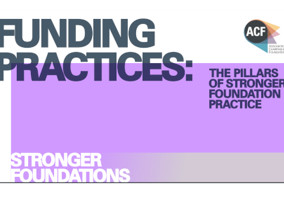The US-based MacArthur Foundation issued a bond to enable it to increase its grantmaking by $125m in response to the pandemic.
Debra Schwartz, managing director impact investments at the foundation, spoke at the NPC Ignites conference about the foundation’s decision to borrow funds so it could give away more money to charities.
The move was announced earlier in the summer at the same time as a group of US foundations collectively committed to give an additional $1.7bn to charities “facing devastating economic effects due to the global pandemic and the epidemic of social injustice”. The Ford Foundation made the biggest commitment of the coalition and launched a $1bn bond.
Market volatility made borrowing a better choice than liquidating
MacArthur Foundation issued the bond in August and has already given out the first $40m in grants.
Schwartz said that this “bold” decision was taken in response to both the unprecedented needs and market conditions.
She said: “The urgency of the problems that we face, coupled with incredibly low interest rates in the bond market, made this as good a time as any to make that bold step.
“As everyone knows, the markets have been on a bit of a roller coaster this year, and that volatility is expected to continue. And when markets are really volatile, that's not a great time to suddenly decide you're going to liquidate an additional chunk of your portfolio.
“So the alternative to doing that extra spending through liquidation in a very difficult market environment was to borrow.”
MacArthur Foundation’s bond lasts 10 years and is a “social” bond, following the principles of the International Capital Market Association. The interest rate was 1.299%, which she said is “incredibly low” and made bonds a “very effective” way of getting extra funds.
“You leave the investments intact, and they are presumably going to earn more than 1.299%. And so you should be able to finance this additional grantmaking without overly dampening your future grantmaking from your regular assets.”
While other foundations in the US have issued bonds in the past, Schwartz said this was usually for capital projects, such as funding a building, not for grantmaking.
It was the first time doing so for MacArthur Foundation, which had to get rated by Moody’s before being able to issue the bond. It got a Aaa rating, which is the highest possible.
In the UK, the Wellcome Trust issued £750m worth of ultra-long bonds in 2018, which were due to mature 100 years later in 2118.
Racial justice as a priority
Schwartz said the foundation is aiming to distribute most of the funds raised through the bond by the middle of next year.
Racial justice is currently one of the foundation’s priority, and some of the money already distributed has gone towards fighting anti-black racism, supporting Native Americans impacted by Covid-19, and strengthening voter education and mobilisation.
Schwartz said: “We really believe that what we need to do is fund racial and social justice movements that are going to drive lasting change to meet this moment. We need to hasten an equitable recovery in the wake of the pandemic.
“We are really committed to a BIPOC-led reimagining of what is possible, and to a future that prioritises the needs and vision of people of colour who are so hard hit by these various crises unfolding today.”
Funders ‘exacerbating’ issues by failing to fund BAME-led charities
The need to address racial justice during the pandemic in the UK was discussed in another panel session about the future of philanthropy.
Sufina Ahmad, director at John Ellerman Foundation, said that while funders have at times shown a will to share their power over charities during the crisis, for example by pledging to be flexible and support them, they have failed to ensure funds go to organisations led by people with lived experience.
She said: “I do think there's also a risk that as funders, during the Covid-19 response, we have potentially exacerbated and further embedded issues.
“The issues I would flag would be our inability to share power as effectively as we might, and particularly in terms of ensuring our funding is reaching lived experience led organisations. In particular organisations that are led by and working with Black and minoritised ethnic groups.”
She said she recognises that some efforts have been made, for example by the London Community Response Fund, but there is still an issue.
She said: “I know that there are moments during this pandemic where people are trying to think differently about their approach to diversity, equity and inclusion. And I hope that those moments become a lot longer and stay as part of the culture and ethos of these funders going forward.
“But I just think it's worth flagging that some of our emergency response may be entrenching issues that we need to be addressing as a sector.”













